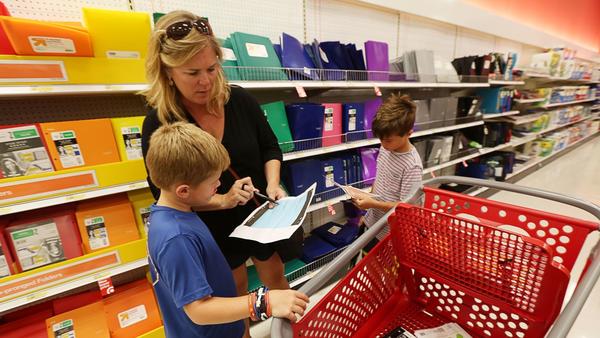Three days of tax-free, back-to-school shopping starts Friday, and stores are expected to be packed despite the internet’s growing encroachment on brick-and-mortar retailers.
“Back to school shopping is a great example of the social experience that shopping is,” said Steven Kirn, a retail professor at the University of Florida. “Especially when you have parents and children shopping together, it shows one of the continuing strengths of stores.”
Nearly three times as many shoppers plan to visit stores compared with shopping online for back-to-school sales, according to a survey from New York City-based research and auditing firm Deloitte. Mostly, consumers will go online to purchase items such as computers and computer hardware such as printers and hard drives.
Parents, store managers and researchers said brick-and-mortar has the advantage on back-to-school shopping, for now, because prices are lower in stores for school supplies and picking the correct sizes for kids can be difficult.
That means aisles will be crammed with parents and students next weekend when the back-to-school shopping season culminates Aug. 4-6.
Shoppers won’t pay the 6 percent to 7 percent state and local sales tax on clothing, shoes, backpacks, school supplies and computers under $750 starting at 12:01 a.m. Friday until 11:59 p.m. Sunday. The sales tax discount is also good on many online purchases for Amazon.com, Walmart.com and Target.com.
Adding to the crowds, retailers also tend to pile their own discounts on top of the sales tax relief, pulling more shoppers into stores.
Many will be heading to mass merchants such as Wal-Mart and Target, according to Deloitte’s survey.
School supply lists in hand, Christina Doolittle and her two elementary age sons grabbed a cart at SuperTarget on Millenia Plaza Way in Orlando Wednesday. Jack, 10, and Grey, 8, crossed off items as they picked through erasers and highlighters and decided which folders to buy among a rainbow of options.
“I haven’t bought anything online for back to school, even though I order a lot of stuff on Amazon at Christmas,” said Doolittle, who lives in Orlando.
Wednesday’s Target trip was her last back-to-school-shopping stop, as she hoped to buy supplies and clothes before the crowds of the tax-free weekend.
Buying school supplies is tough online, she said, because items aren’t available in small quantities. Schools and teachers also have specific requirements for items such as folders. It’s safer to head to the store, she said.
Physical stores have some distinct advantages, Kirn said.
“The existing model of shipping items to stores, to be distributed to the masses is very efficient for things like school supplies,” Kirn said. “There just isn’t the margin to sell things like one or two pencils or erasers on Amazon in the quantity that people want to buy them in.”
Kirn said online sellers could have an advantage on items such as computers and hardware, where size and processing power is more important than touch and feel.
“A computer is a computer no matter where you are in the country,” Kirn said.
The Florida Legislature sets the tax-free period every year. This year’s holiday is three days and gives an exemption on shoes and clothing items up to $60 each, school supplies less than $15 each, and computers less than $750. Backpacks also must cost less than $60 to qualify. Shoppers can also skip the sales tax on dozens of related items from tuxedos and diaper bags to coats and cleats.
The program is expected to save Florida consumers about $33.2 million in state and local sales taxes, according to estimates from the Florida Office of Economic & Demographic Research. As recently as 2015, Florida shoppers were given a 10-day sales-tax holiday, but that cost state and local governments about twice as much in sales tax revenue.
Most shopping still happens in stores and back-to-school season is a good example of where brick-and-mortar has an advantage, Florida Retail Federation spokesman James Miller said.
According to the U.S. Census Bureau, about 8 percent of all retail sales happen online, including grocery sales.
Another reason, Miller said, is that children can grow quickly and make it difficult to buy accurate clothing sizes online.
“When it comes to clothes, there is a large segment of the population that still wants to try on items in person,” Miller said. “That may change over time, but we’re a long way from that point.”
Got a news tip? karnold@orlandosentinel.com or 407-420-5664; Twitter, @kylelarnold or facebook.com/bykylearnold
Tax-free weekend — Aug. 4 to 6
What’s exempt from sales tax?
- Clothes, shoes, backpacks less than $60
- School supplies less than $15 each
- Computers and hardware less than $750
- Cleats, coats, bras, costumes under $60
What’s not?
- computer paper
- batteries
- sporting equipment
- computer bags
- roller skates
- wigs
- luggage
For more info: www.floridarevenue.com
